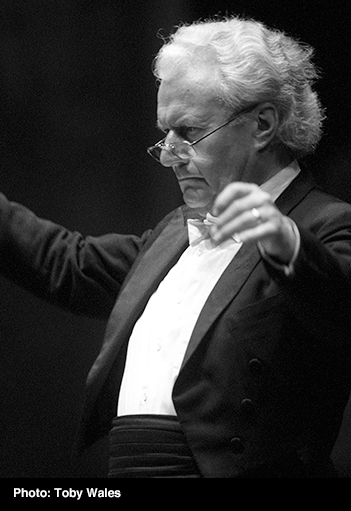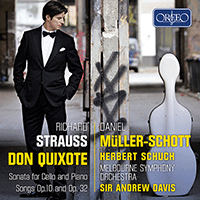Andrew Davis
Andrew Davis studied at the Royal College of Music and was organ scholar at King’s College, Cambridge between 1963 and 1967 during Sir David Willcocks’s period as Director of Music. After leaving Cambridge he studied conducting with Franco Ferrara at the Accademia di Santa Cecilia in Rome on an Italian government scholarship and together with three others was selected by Sir Charles Groves to take part in the Royal Liverpool Philharmonic Orchestra’s seminar for young conductors during 1969. Having been appointed associate conductor with the BBC Scottish Symphony Orchestra with effect from 1970 for two seasons, in November 1970 he shot to notice in London when he substituted for Eliahu Inbal as the conductor of the BBC Symphony Orchestra in a performance of Janáček’s Glagolitic Mass, for which he had only two days’ preparation.
During the early 1970s Davis began to feature prominently as a conductor at the BBC’s Promenade Concerts, directing many powerful performances that belied his young age and relative lack of musical experience. In 1973 he was appointed associate conductor of the New Philharmonia Orchestra, and made his debut at the Glyndebourne Festival Opera conducting Richard Strauss’s Capriccio. He held the position of principal guest conductor of the Royal Liverpool Symphony Orchestra for three seasons from 1974, the year in which he made his North American debut with the Detroit Symphony Orchestra. Following this he was appointed chief conductor of the Toronto Symphony Orchestra, a post he held from 1975 to 1988. He returned to the United Kingdom to take up two significant posts within British musical life: the chief conductorship of the Glyndebourne Festival Opera from 1988 and of the BBC Symphony Orchestra from 1989.
With the BBC Symphony Orchestra Andrew Davis developed the tradition of innovative programming established by the orchestra’s first chief conductor, Sir Adrian Boult. His programmes included many notable concert performances of opera rarely seen on the stage, and festivals devoted to single composers such as Hindemith, Janáček, Ives, Messiaen and Kurt Weill. As well as appearing frequently at the BBC Proms, where he came to be a skilled specialist in leading the celebratory Last Night, he toured extensively with the orchestra to the Far East, North America and across Europe. As chief conductor at Glyndebourne he made a major impact conducting the operas of Janáček (Jenůfa, Kát’a Kabanová) and Tchaikovky (The Queen of Spades, Eugene Onegin). In addition he conducted the traditional canon of the Mozart/da Ponte operas and many of the operas of Richard Strauss, as well as a searing reading of Alban Berg’s Lulu. He relinquished both his Glyndebourne and BBC posts in 2000 to take up the position of chief conductor of the Lyric Opera of Chicago, where he conducted Wagner’s Ring cycle.
Throughout his time in both Canada and England Davis also appeared internationally as a guest conductor with numerous front-rank orchestras such as the New York Philharmonic, Philadelphia, Cleveland, Royal Concertgebouw, Vienna Symphony and London Symphony, as well as holding the post of principal guest conductor of the Royal Stockholm Philharmonic Orchestra between 1995 and 1999. In the field of opera he made his debut at the Metropolitan Opera during the 1996–1997 season with Humperdinck’s Hänsel und Gretel, which was followed by Capriccio the next season. He has also appeared as a guest conductor with the San Francisco Opera, Bavarian State Opera and Royal Opera House, Covent Garden. In 2002 he made his debut at the Bayreuth Festival conducting Lohengrin. He was awarded the CBE in May 1992 and in January 1999 he received a knighthood.
Andrew Davis is a highly effective conductor whose relative lack of podium flamboyance hides a deep natural musicality, passionate commitment, and infectious enthusiasm. Together these characteristics can often produce powerful results. He is an outstanding interpreter of the music of Sir Edward Elgar, many of whose major works he has recorded; he also gave the first performance of Anthony Payne’s reconstruction of Elgar’s Symphony No. 3. He is very much at home too in the music of Delius, Vaughan Williams and Tippett, and has recorded much of their music with the BBC Symphony Orchestra. A sympathetic interpreter of contemporary music, together with the BBC Orchestra he has made several notable recordings of English music of the present day, by composers such as Harrison Birtwistle (The Mask of Orpheus), Nicholas Sackman, and David Sawyer.
In more mainstream repertoire he has recorded the symphonies of Dvořák with the Philharmonia Orchestra, of Mendelssohn with the Bavarian Radio Symphony Orchestra, and of Borodin with the Toronto Symphony Orchestra; and shown himself to be a fine conductor of the music of Bartók, Lutosławski, Janáček and Sibelius in recordings with the Royal Stockholm Philharmonic Orchestra. Davis has also recorded Nielsen’s Symphonies Nos 4 and 5, the Shostakovich violin concertos and the Brahms piano concertos, again with the BBC Symphony Orchestra. His operatic readings are seriously under-represented on disc, but many of his Glyndebourne performances have been published on video and DVD. Andrew Davis has been steadily building a solid career as an international conductor of the first rank, and there is no reason to doubt that, as is often the case with conductors, his later years will be even more rewarding than the earlier years of his career.
© Naxos Rights International Ltd. — David Patmore (A–Z of Conductors, Naxos 8.558087–90).

















